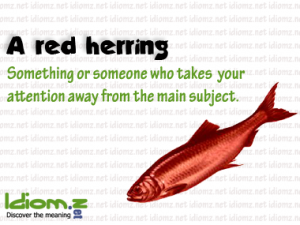
Page Description
Impossible or extremely difficult to find
or Intentionally misleading or distracting,
and which diverts attention away
from the real issue or topic at hand.

A needle in a haystack
Something that is impossible or extremely difficult to find, especially because the area you have to search is too large:
Finding the piece of paper I need in this huge pile of documents is like looking for/trying to find a needle in a haystack
Cambridge Dictionary
Red herring:
A fact, idea, or subject that takes people’s attention away from the central point being considered:
The police investigated many clues, but they were all red herrings.
Racism was not a factor in the case – that was a red herring thrown in by the defense lawyers.
Cambridge Advanced Learner’s Dictionary
The Obstacles to Fair Judgment: Unveiling the Complexities of Decision-Making
Judging something involves numerous obstacles, namely:
Loss of Genuine Human Interaction
Healthy human conversation is a cornerstone of sound judgment. When this is absent, it signals a serious deficiency in the process.Lack of Transparency
The obviousness of the situation can disappear when data is not readily available due to the circumstances one faces.Fragmentary Information
Often, judgments are made based on incomplete or fragmented data. This creates a situation akin to working in twilight or total darkness, where one cannot perceive the surrounding details and must grope blindly for understanding.Inadequate Mindset
A fair judgment becomes impossible when one lacks awareness, insight, a proper value scale, emotional sensitivity, or intellectual depth. These deficiencies hinder the development of a healthy understanding.Indifference or Limited Perspective
Indifference or a narrow viewpoint can lead to judgments that fail to align with reality. Without the capacity to grasp the full scope of a situation, a correct judgment remains elusive.Unfamiliar Circumstances
Certain phenomena occur only under specific conditions, which may be unfamiliar to the observer. For example, olive oil solidifies around zero degrees Celsius, making it impossible to pour—something one might not know without prior exposure.Flaws in the Legal System
The legal system can be riddled with loopholes or abuses that obstruct justice. Fraudulent systems that disrupt fair processes should not exist, yet in reality, they do, leading to inevitable errors.Double Standards and Contrasting Realities
Double standards can obscure fairness. For instance, a child is judged within the context of their world, with care and sensitivity, whereas adults may be judged by standards completely foreign to their lived experience.Ethics and Exceptions
Ethical considerations must take precedence. For example, Mauro, a well-known asylum seeker in the Netherlands, faced deportation despite widespread support for his case. A team of 12 professors advocated for using discretionary powers to resolve the situation, but Minister Gerd Leers refused. It wasn’t until a new minister, Fred Teeven, introduced the “child pardon” law that Mauro was allowed to stay, following an interim student visa solution.Contrast this with the case of a 22-year-old Malian man in France who saved a child dangling from a balcony. His heroic act garnered worldwide admiration, and he was swiftly granted French citizenship, a job, and public recognition by President Emmanuel Macron.
The Power of Emotional Sensitivity
When ethical value or a touching act captures public emotion, extraordinary measures often become possible.Disconnected from Reality
Living in a bubble or being detached from reality inhibits sound judgment.Sensationalism and False Narratives
Sensationalist tendencies or fabricated stories undermine the ability to make fair assessments.Lack of Precautions
Failure to take necessary precautions or thorough measures can result in superficial judgments.Prejudices and Assumptions
Starting from unexamined axioms or baseless prejudices leads to flawed conclusions. Any missing explanation or inconsistency is a sign that judgment has gone awry.Attention to Reality
The core issue must remain the focus. Subordinate data or distractions should not overshadow the main point, as this is often a sign of deception.Consistency and Thoughtfulness
Judgments should be consistent and grounded in careful consideration to avoid deception.
In Summary:
This discussion encapsulates the challenges of fair judgment. A more detailed exploration of these concepts can be found in the paper bundle referenced in
De Obstakels voor Eerlijke Beoordeling: Het Onthullen van de Complexiteit van Besluitvorming
Iets beoordelen kent een aantal obstakels, namelijk:
- Vooreerst is er het gezond menselijk gesprek, indien men merkt dat zoiets wegvalt is er iets ernstigs die mankeert in het gebeuren.
- De vanzelfsprekendheid valt weg omdat de gegevens niet gewoon ter beschikking gesteld worden, door de omstandigheden waarin je terechtkomt.
- Bij het beoordelen zijn vaak slechts fragmentarisch gegevens gekend of er wordt slechts fragmentarisch rekening mee gehouden. Men zit als het ware in het schemerdonker of in de duisternis te werken en ziet helemaal niets van details in de omgeving, op de tast kan je onmogelijk iets vinden.
- De mindset kan zo zijn dat men onmogelijk tot een fair oordeel kan komen, o.a. men heeft niet het besef, inzicht, waardenschaal, emotionele gevoeligheid of het niveau enzovoort, om tot een gezond inzicht te komen.
- Wanneer je onverschillig bent of geen kennis hebt van de werking van iets of vast zit met een enge kijk op iets, heb je evenmin een fair of juist oordeel in overeenstemming met een werkelijkheid die je als het ware niet kunt vatten.
- Het kan zijn dat men de omstandigheden niet kent, waardoor iets zich slechts in bepaalde omstandigheden kan voordoen die normaal niet voorkomen. Men heeft geen enkel beeld of referentie nopens die omstandigheden die zich nooit voordoen. Een eenvoudig voorbeeld olijfolie bij temperatuur rond het nulpunt stolt helemaal en krijg je onmogelijk nog uit de fles. Dit is iets waarmee je normaal nooit geconfronteerd wordt, waardoor je dit niet kent.
- Het juridisch systeem kan zo lek zijn als een zeef – zoals op zoveel manieren in de video’s aan de oppervlakte komt. Of er kan op zoveel manieren misbruik zijn, zodat je in een context komt waarin alles volledig blokkeert. Het dient zo te zijn dat fraude systemen om een verloop te ontwrichten, niet mogelijk mogen zijn. Dit is niet de werkelijkheid en men dient dus rekening te houden dat er fouten kunnen gemaakt worden.
- Het werken met twee maten en twee gewichten, twee werelden. Het is de wereld niet van de persoon die dient te oordelen. Het is iets die hem compleet vreemd is.
- Een kind wordt op een passende wijze met zorg beoordeelt overeenstemmend met zijn wereld.
- De ethiek dient zijn kans te krijgen, voorbeeld de uitzonderingssituatie van Mauro, de bekendste asielzoeker uit Nederland kon men in werkelijkheid niet op een correcte basis terugsturen. Ondanks uiteindelijk een team van 12 professoren uit allerlei universiteiten in Nederland duidelijk maakten dat hier het voorziene middel van discretionaire bevoegdheid van de minister het middel is, wilde Gert Leers die niet gebruiken. Uiteindelijk heeft de nieuwe minister Fredrik (Fred) Teeven de wet gewijzigd en het kinderpardon ingevoerd en kon Mauro na de tussenoplossing van het studentenvisum, een studie die voor hem te hoog was, dan uiteindelijke wel in Nederland blijven.
- In Frankrijk werd de Malinese 22 jarige jongen, die een kind redde die aan de balkonleuning hing op de vierde verdieping, omwille van zijn daad als superheld onmiddellijk geregulariseerd en kreeg de Franse identiteitskaart met goedvinden van heel Frankrijk. Die dag waren de beelden wereldwijd te zie op alle TV zenders overal ter wereld. Hij werd ontvangen door de president Emmanuel Macron, kreeg onmiddellijk werk, de burgemeester nam het voor hem op enzovoort.
- Wanneer de emotionele gevoeligheid unaniem gedragen wordt voorbeeld omwille van de ethische waarde van de daad of omdat men het hart steelt is alles mogelijk.
- Er is de magie van een kind die alles doorbreekt.
- Disconnected with reality, living in a bubble, zoals hoger reeds aangestipt, verhindert dat er een correct oordeel komt.
- Wanneer iemand sensatiebelust is en er een fake story ontstaat kan men evenmin tot een correct oordeel komen
- Geen of te weinig voorzorgen nemen om te voorkomen dat er fouten worden gemaakt, is eveneens oorzaak dat het een oordeel is voor de schijn.
- Ter herinnering: de kwestie dient goed uitgelegd te worden. Men kan niet vertrekken vanuit een axioma of vooroordelen of iets die op niets steunt.
- Indien aan dit punt iets ontbreekt, is dit de indicatie dat men verkeerd bezig is.
- Men mag ook niet uit het oog verliezen dat er altijd indicaties aan de oppervlakte komen, of dingen opvallen nopens hoe de werkelijkheid in elkaar zit.
- Het echte onderwerp verdient de aandacht. Een sub gegeven mag niet de substituut worden van het het werkelijke gegeven. Dit is een indicatie van misleiding.
- Het geheel dient in het gehele verloop consistent te zijn.
- Het is belangrijk dat er over alles grondig wordt nagedacht, om misleiding te vermijden.
In het bundel op papier – vernoemd ‘The making of’ – staat wat hier in vogelvlucht wordt weergegeven, uitvoeriger.
The idiom “a red herring” is typically used to refer to a piece of information or argument that is intentionally misleading or distracting, and which diverts attention away from the real issue or topic at hand. Here are some key points to keep in mind about this idiom:
Origin: The term “red herring” originally referred to a smoked herring fish that was often used to distract hunting dogs from the scent of their prey. This technique was sometimes used in training the dogs, and the term “red herring” eventually came to be used metaphorically to refer to any intentional distraction.
Meaning: Today, the idiom “a red herring” is used to describe any misleading or irrelevant information that is used to divert attention away from a more important issue. It can be used in a wide range of contexts, from politics and business to everyday conversations.
Examples: For example, a politician might use a red herring by bringing up an unrelated issue during a debate in order to distract voters from a more difficult question. In a criminal investigation, a red herring might be a false lead that is intentionally planted in order to throw investigators off the trail of the real culprit.
Impact: The use of a red herring can be detrimental to the pursuit of truth or resolution of a problem, as it can cause confusion and waste time and resources. It is important to recognize when a red herring is being used and to stay focused on the real issues at hand.
Similar idioms: Other idioms that are similar in meaning to “a red herring” include “smoke and mirrors,” “a wild goose chase,” and “a distraction.”
1 – 9 Year Old Boy Cries During Audition – Then Amazes Everyone

The video aside illustrates the appropriate spontaneous humanity with which one judges a 9-year-old child.
It goes without saying, a judgment is a whole, which is taken into account in a fair way.
De video illustreert de passende spontane menselijkheid waarmee men een kind van 9 jaar beoordeelt.
Het spreekt voor zich, een oordeel is een geheel, waar op een faire wijze rekening wordt mee gehouden.
1 Building a new generation of public defenders | Jonathan Rapping | TEDxAtlanta
Attorney Jonathan Rapping knows, “it’s really hard to be a caring lawyer. Caring is painful.” His organization, Gideon’s Promise, is inspiring a new generation of public defenders facing “the nation’s greatest civil rights issue today” – the tragic shortage of representation for those who can’t afford a lawyer.
Jonathan Rapping is strengthening public defenders and transforming public defense across the nation.
The 1963 Supreme Court ruling, Gideon V. Wainwright, mandated that poor people accused of crimes must be provided counsel if we are to live up to our nation’s promise of equal justice. Today, however, our nation’s jails and prisons are disproportionately populated with members of our most vulnerable communities due to structural, financial, and cultural challenges that have kept us from fulfilling this promise. Through Gideon’s Promise, Jon is building a new generation of public defenders to address these challenges and help shift the nation towards true equality in our justice system.
This talk was given at a TEDx event using the TED conference format but independently organized by a local community. Learn more at http://ted.com/tedx
BOOKMARK
Gepubliceerd op 13 jul. 2014
“A needle in a haystack” is a commonly used idiomatic expression that refers to something that is very difficult or nearly impossible to find or locate because it is surrounded by a vast number of similar objects or information.
Some key points about “a needle in a haystack” are:
Origin: The phrase “a needle in a haystack” is believed to have originated in the 16th century and has been used in various literary works since then.
Meaning: The phrase refers to the difficulty of finding something that is very small or hidden among a large number of other objects or information, making it almost impossible to find.
Usage: The phrase is commonly used in everyday speech to express the idea of searching for something that is hard to find or obtain.
Contexts: The idiom can be used in various contexts, such as searching for a lost item, looking for a specific piece of information in a large database, or trying to identify a particular individual among a crowd of people.
Solutions: In order to find a needle in a haystack, one may need to use specialized tools or techniques such as magnets or metal detectors, or to employ a methodical approach to systematically search through the haystack. Alternatively, the use of advanced technology such as artificial intelligence may help to quickly locate the desired object or information.
“Keeping up Appearances” is a British sitcom that originally aired from 1990 to 1995. The show revolves around the life of Hyacinth Bucket (pronounced “Bouquet”), a middle-class woman obsessed with her social status and her desire to climb the social ladder.
Here are some key points of the show:
Hyacinth Bucket is the main character, and she is determined to project an image of being upper-class and refined, despite her modest background.
Hyacinth’s husband, Richard, is a long-suffering man who is often dragged into his wife’s schemes and social aspirations.
The show features a cast of quirky and eccentric characters, including Hyacinth’s sisters, Rose and Daisy, and her neighbors, Elizabeth and Emmett.
Many of the show’s jokes and humor come from the contrast between Hyacinth’s pretensions and the reality of her situation.
Hyacinth is constantly striving to improve her social status, whether it’s by joining various committees or attending high-class events, but her efforts often backfire.
The show also explores themes of family, friendship, and community, as Hyacinth navigates her relationships with her family and neighbors.
Overall, “Keeping up Appearances” is a classic British sitcom that is known for its wit, humor, and memorable characters.
While “Keeping Up Appearances” is primarily known as the title of the British sitcom, the phrase “keeping up appearances” is also used as an idiom in the English language. Here are some key points about the idiom:
“Keeping up appearances” means maintaining a certain image or facade in order to present oneself as successful, respectable, or socially acceptable, even if this image is not entirely accurate or truthful.
The phrase can be used to describe individuals or groups who prioritize outward appearances over substance or authenticity.
“Keeping up appearances” can also refer to situations where people pretend to be something they’re not in order to fit in or impress others.
The idiom is often used in a negative context to criticize people who are overly concerned with their public image and fail to prioritize more important aspects of their lives, such as personal relationships or inner values.
The phrase can also be used in a positive context, such as when someone maintains a positive attitude and appearance in the face of difficult circumstances.
Overall, “keeping up appearances” is a common idiom that refers to the act of maintaining a certain image or facade in order to present oneself in a certain way.
3 Cheating Meter Maid
9 apr. 2011
Parking police woman hides the fire hydrant under her skirt and then gives a ticket to the people who park in that spot. A presentation of the Just For Laughs Gags. The funny hidden camera pranks show for the whole family. Juste pour rire les gags, l’émission de caméra caché la plus comique de la télé!